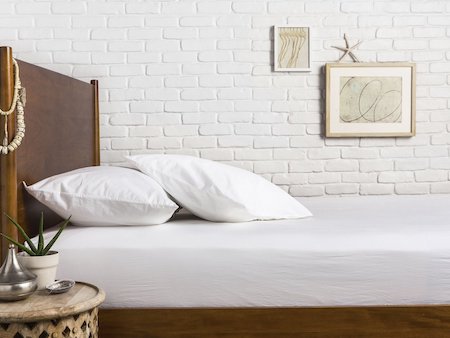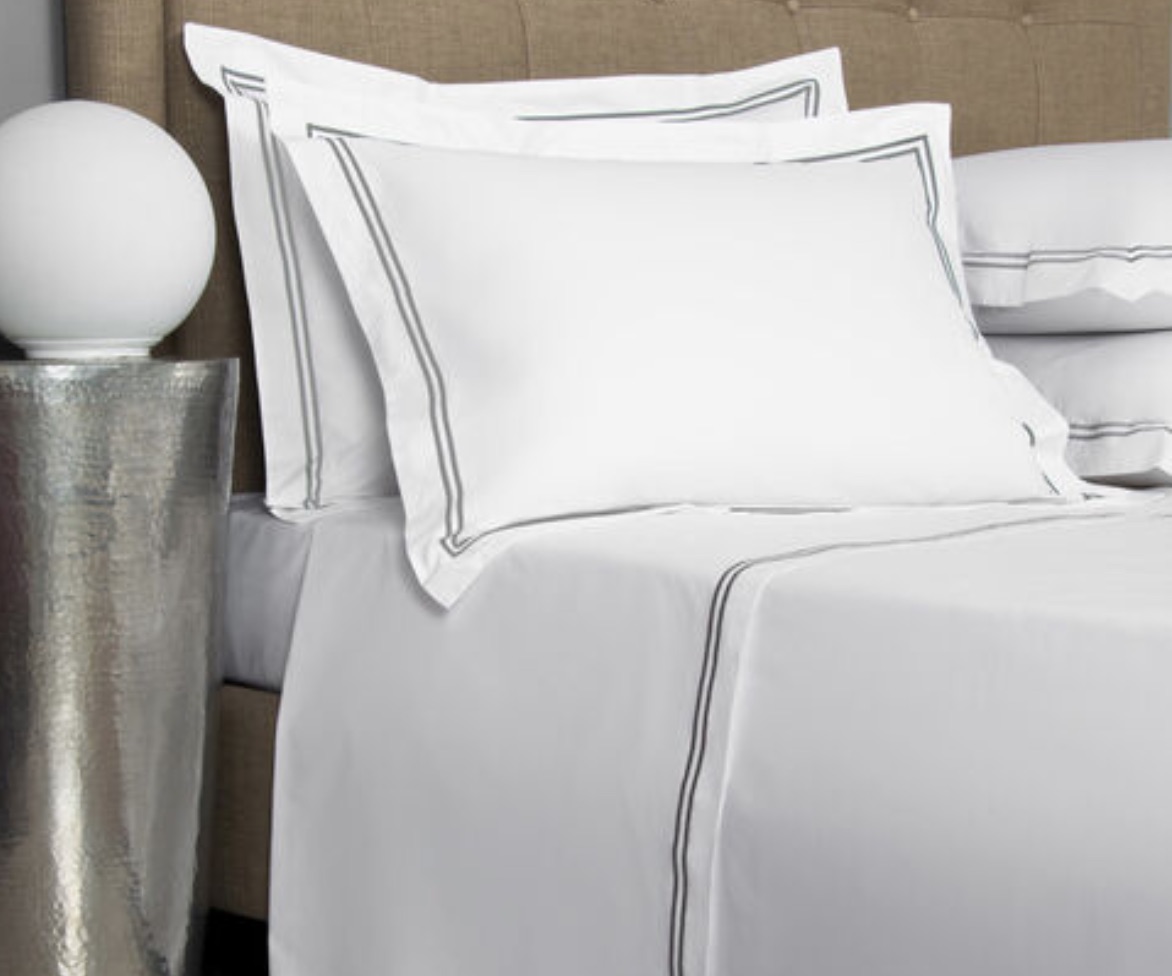Buying Guide – Shopping for the Best Hotel Sheets
Choosing the right hotel sheets can bring that “vacation” feeling to your own bedroom every night. Read on for some more details about what makes hotel sheets special, what to look for in a set of sheets, and what you should consider when comparing your options.
What Are Hotel Sheets?
When you stay in a hotel, you expect to sleep on soft, comfortable sheets. In fact, hotels often use their sheets as a marketing tool, enticing customers with terms like “European linens” or “luxurious bedding.” You can recreate that experience at home with hotel sheets.
Although some bedding manufacturers use the term “hotel sheets” to describe their products, it’s not a specific or consistent type of sheets. Rather, it refers to “hotel style” sheets, meant to mimic the experience of sleeping in a hotel.
In general, this means that the sheets are either 100 percent cotton or a cotton blend (usually cotton/polyester), wrinkle resistant, and durable enough to withstand frequent washing. The most common types of cotton used in hotel sheets are Egyptian or Pima, which are naturally soft and smooth, and resist pilling and fraying better than other fibers due to their long-staple fibers.
Ultimately, what sets hotel-style sheets apart from others is their luxurious feeling. They tend to be smooth and crisp as well as soft, and offer an exceptionally comfortable sleeping experience.
How to Choose the Right Hotel Sheets
Materials
Most hotel sheets are made from cotton or a cotton/polyester blend. Cotton is preferable for several reasons. First, it’s durable. The average hotel sheet is washed as many as 300 times a year, 10-15 times more often than your sheets at home. They need to withstand so many washings while still maintaining a smooth, soft feel, and high quality cotton or a cotton/polyester blend can do that.
The most common types of cotton used in hotel sheets are Egyptian, Pima, and in some cases, Supima. Egyptian cotton refers to a specific type of long-staple cotton grown in Egypt. The fibers of true Egyptian cotton are typically 1-2 inches long, creating a more durable and smoother fabric than other cotton types.
Pima cotton is a generic term for high quality cotton grown anywhere, and it may or may not be extra long-staple. Supima cotton, on the other hand, is an extra long-staple cotton grown only in the U.S. that provides exceptional softness and durability.
Fit
Hotel sheets are generally available in standard bed sizes (twin, full, queen, and king). Some brands also offer twin XL and California king sheets. When shopping for sheets, it’s most important to look at the pocket depth.
Not all sheets will fit thicker mattresses that are more than 12 inches thick, which can lead to the fitted sheet popping off when it doesn’t extend over the entire width of the mattress. Sheets with deeper pockets will fit over thinner mattress profiles, but you may need to tuck the excess fabric under the mattress for a snug fit.
Weave
The most common weaves for hotel sheets are percale and sateen. Percale is a plain one-over, one-under weave, tightly woven for a smooth and firm feeling. Unlike other weaves, like damask or sateen, percale doesn’t feature any sheen or intricate designs. It’s a crisp weave that holds up well to washing and breathes well, so it stays cool even on the hottest nights.
Sateen is a slightly heavier weave that uses a four-over, one-under weave pattern that results in a slight sheen. For that reason, it feels smooth and silky to the touch, and looks a bit more formal than percale. Sateen also sleeps warmer than percale.
Thread Count
Thread count is often misunderstood by shoppers when comparing sheets. There’s a perception that the higher the thread count, the better the sheet quality. However, thread count is not always an accurate indicator of the quality or softness of a sheet, and some manufacturers use it as a marketing ploy.
The term thread count refers to the number of threads woven within one square inch of fabric. Although you might see thread counts of 600, 800, or even 1,000 or more, those numbers are generally inflated, as it’s all but impossible to fit more than 600 individual threads into one square inch.
To achieve higher thread count sheets, manufacturers might use thinner threads, which compromise the durability of the fabric. Or they may use double or triple ply threads (multiple single strands twisted together) in order to double or triple the actual thread count.
Ultimately, higher thread counts do not automatically equal higher quality sheets. Instead, look for sheets made from fabric woven with high quality materials to improve your sleep and ensure the longevity of your bedding.
What Else Should You Consider When Buying Hotel Sheets?
When you’re looking for hotel sheets, you might start by calling your favorite hotels to inquire about the sheets they use. Many hotels will gladly provide this information – some even offer guests the opportunity to purchase the same bedding used in guest rooms directly from them.
Other things to consider when purchasing hotel-style sheets include:
- Care Instructions: Most hotel-style sheets are machine washable and are designed to withstand regular (in some cases, daily) cleaning.
- Purchase Options: Hotel-style sheets are typically sold in sets including flat and fitted sheets and pillowcases. You may also have the option to purchase individual pieces, which may be a better value if you don’t typically use a flat sheet or would prefer to mix-and-match colors.
- Color Availability: Most hotel sheets are available in white and neutral shades. Patterns or embellishments are rare, and tend to be subtle.
- Pocket Depth: Some sheets are available in multiple pocket depths to accommodate a variety of mattress sizes. Measure your mattress before purchasing to ensure you make the right selection.
- Trials and Warranties: Before purchasing, confirm the manufacturer’s policies regarding sleep trials, warranties, and returns. Some companies will only allow returns of unopened packages, while others offer generous trial periods to give you the opportunity to sleep on and wash the sheets.





